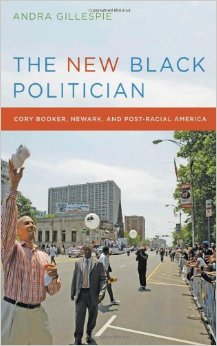 |
|
 |
|
 |
 |
 |
 |
 |
 |
 |
 |
 |
 |
| 2016 Election: | Hillary's book | Trump's book | Bernie's book | Ted Cruz's book | | | 2016 Senate Debates |
The New Black Politician Cory Booker, Newark, and Post-Racial America by Andra Gillespie  (Click for Amazon book review)
OnTheIssues.org BOOK REVIEW: This book is a political biography of Cory Booker, but it is written from an academic perspective. A VERY academic perspective! But Cory Booker, at the time this book was written, was the up-and-coming Mayor of Newark, and is now the newly-elected Senator from New Jersey. And there are few other biographies of Cory Booker, so this one will have to do, academics and all. Cory Booker is currently the only African-American elected member of the U. S. Senate (Senator Tim Scott (R-SC) is a second African-American member, but he was appointed, not elected; he is up for election in November 2014). Cory Booker was by no means the only African-American elected mayor -- there are plenty of examples long before Booker. But the author of this book was well aware that Booker would soon move up to higher office (she actually predicted Booker would run for Governor, but then Senator Frank Lautenberg died in office and Booker ran in the special Senate election). So the author used Booker as the example for an academic study of up-and-coming black politicians, and now Booker has become a important example -- and hence the lessons learned in his history, and detailed in this book, have become important too. By "a VERY academic perspective" we mean that there are charts and graphs and footnotes to document every point the author makes. If you're not intimidated by those sorts of things, you'll enjoy the "regression model of district-level support for Cory Booker" (p. 99-100) which lays out the correlation of race vs. voting for Booker in the 2006 mayoral race (Booker did better among Latinos than among blacks, since Booker's opponent, Mayor Sharpe James, was also black). That 2006 mayoral race provides much of the fodder for the academic analysis of this -- along with the 2002 race which was also against Sharpe James. The key distinction in the 2002 and 2006 mayoral races, as the author sees it, is that James was a long-term resident of Newark with a long-term relationship with the population, while Booker was a relative outsider (Booker grew up in the suburbs of Newark, then commuted to Yale from Newark, nearly 100 miles; p. 50). The author relates Booker's outsider status to other black politicians too, who must address whether street credibility (which James had) or professional credibility (which Booker had) is more relevant to voters. The author also addresses generational politics, which in the case of black politicians means the older generation who fought the Civil Rights battles, versus the younger generation who grew up with the benefits of the Civil Rights successes (p. 179). The author frames the entire discussion in terms of "elite displacement," which means that "black political challengers seize on both the moral and political failings of incumbent black leaders to challenge them for political office." This book's core theme is that Booker attempted "elite displacement" unsuccessfully in 2002, because Booker was too much the outsider; but after 4 more years in Newark (serving on the City Council) that outsider status had become minimal enough that "elite displacement" was successful in 2006. The problem with an academic biography is that it's… academic. Terms like "elite displacement" put off most readers (the term certainly confused me every time I read it, because Booker was the "elite" of the two candidates, by credentials, while the author meant that James was the "elite," by incumbency. I think "incumbent displacement" would be a better term). The VERY academic parts are the usual academic vocabulary, which in my view is unnecessarily off-putting to most readers. Terms like "comity" (p. 189); "deracialized" (p. 226 & 236); "reified" (p. 231); and "gravitas" (p. 233) -- the author uses those because her audience is academic, which makes this book less accessible to the voting public. We at OnTheIssues always focus on the voting public! Overall, this book is a solid biography of Booker, and serves as a useful template for both black and non-black candidates in the future. The detailed election analysis (p. 59), the concept of "elite displacement", the battle between street credibility and professional credibility -- those apply to many political campaigns, regardless of the race of the candidates. Seeing this sort of analysis about black candidates, in a predominantly black community, by a black author -- that's refreshing after reading dozens of analogous analyses over the years about white candidates. Perhaps the author will write additional analyses in the future -- we'll struggle through the overly academic terminology and look forward to reading them. -- Jesse Gordon, editor-in-chief, OnTheIssues.org, August 2014
Cory Booker, Newark, and Post-Racial America by Andra Gillespie.
| ||||||||||||||||||||||||||||||||||||||||||||||||
| ||||||||||||||||||||||||||||||||||||||||||||||||
Page last edited: Feb 19, 2019